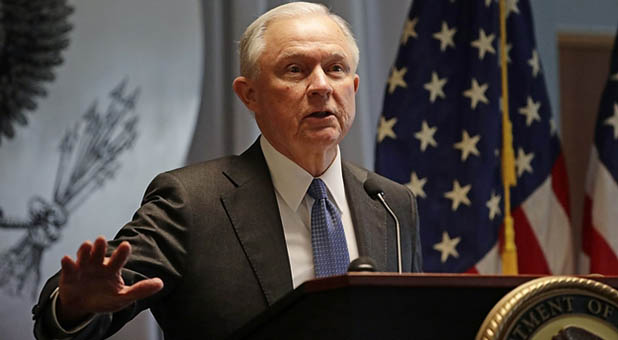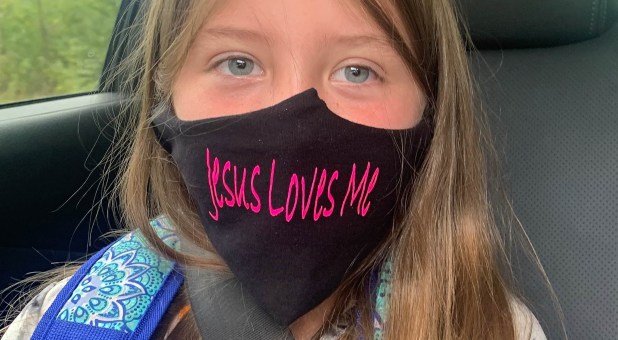The liberal mainstream media are making a big deal of one part of President Donald Trump’s budget proposal that calls for a provision to tie government funding to compliance with federal immigration law.
So-called “sanctuary jurisdictions” would lose federal funding under the plan, matching the calls of many conservatives in and out of government who seek to restore the rule of law in the U.S. But many seem to be confused about just what a “sanctuary jurisdiction” actually is.
Attorney General Jeff Sessions recently sent out a directive to the Department of Justice that is meant to clarify the issue. It states:
Federal law provides a process for foreign citizens to lawfully enter the country. Circumventing that process and crossing our borders unlawfully is a federal crime. It is the role of federal agencies, including the Department of Justice, to enforce our immigration laws, prosecute violations, and secure our borders.
The president has established immigration enforcement as a priority for this administration and, in furtherance of that priority, issued Executive Order 13768, “Enhancing Public Safety in the Interior of the United States,” on January 25, 2017. The executive order makes clear that “[i]t is the policy of the executive branch to ensure, to the fullest extent of the law, that a State, or a political subdivision of a State, shall comply with 8 U.S.C. 1373.” To accomplish this policy, section 9(a) of the executive order provides, in part:
[T]he attorney general and the secretary [of Homeland Security], in their discretion and to the extent consistent with law, shall ensure that jurisdictions that willfully refuse to comply with 8 U.S.C. 1373 (sanctuary jurisdictions) are not eligible to receive federal grants, except as deemed necessary for law enforcement purposes by the attorney general or the secretary. The secretary has the authority to designate, in his discretion and to the extent consistent with law, a jurisdiction as a sanctuary jurisdiction.
Section 1373 provides in part that state and local jurisdictions “may not prohibit, or in any way restrict, any government entity or official from sending to, or receiving from, [federal immigration officers] information regarding the citizenship or immigration status, lawful or unlawful, of any individual.” 8 U.S.C. § 1373(a).
In accordance with my duties as attorney general, I have determined that section 9(a) of the executive order, which is directed to the attorney general and the Secretary of Homeland Security, will be applied solely to federal grants administered by the Department of Justice or the Department of Homeland Security, and not to other sources of federal funding. Section 9(a) expressly requires enforcement “to the extent consistent with law,” and therefore does not call for the imposition of grant conditions that would violate any applicable constitutional or statutory limitation. Nor does the executive order purport to expand the existing statutory or constitutional authority of the attorney general and the secretary of homeland security in any respect. Indeed, apart from the executive order, the Department of Justice and the Department of Homeland Security, in certain circumstances, may lawfully exercise discretion over grants that they administer. Section 9(a) directs the attorney general and the secretary of homeland security to exercise, as appropriate, their lawful discretion to ensure that jurisdictions that willfully refuse to comply with section 1373 are not eligible to receive Department of Justice or Department of Homeland Security grants.
Consistent with the executive order, statutory authority and past practice, the Department of Justice will require jurisdictions applying for certain department grants to certify their compliance with federal law, including 8 U.S.C. § 1373, as a condition for receiving an award. Any jurisdiction that fails to certify compliance with section 1373 will be ineligible to receive such awards. This certification requirement will apply to any existing grant administered by the Office of Justice Programs and the Office of Community Oriented Policing Services that expressly contains this certification condition and to future grants for which the Department is statutorily authorized to impose such a condition. All grantees will receive notice of their obligation to comply with section 1373. The department will administer this certification requirement in accordance with the law and will comply with any binding court order.
After consultation with the secretary of homeland security, I have determined that, for purposes of enforcing the executive order, the term “sanctuary jurisdiction” will refer only to jurisdictions that “willfully refuse to comply with 8 U.S.C. 1373.” A jurisdiction that does not willfully refuse to comply with section 1373 is not a “sanctuary jurisdiction” as that term is used in section 9(a). While the executive order’s definition of “sanctuary jurisdiction” is narrow, nothing in the executive order limits the department’s ability to point out ways that state and local jurisdictions are undermining our lawful system of immigration or to take enforcement action where state or local practices violate federal laws, regulations, or grant conditions.
The provisions of the executive order quoted above address only 8 U.S.C. § 1373. Separate and apart from the executive order, statutes may authorize the department to tailor grants or to impose additional conditions on grantees to advance the department’s law-enforcement priorities. Consistent with this authority, over the years, the department has tailored grants to focus on, among other things, homeland security, violent crime (including drug and gang activity) and domestic violence. Going forward, the department, where authorized, may seek to tailor grants to promote a lawful system of immigration. {eoa}
See an error in this article?
To contact us or to submit an article






















